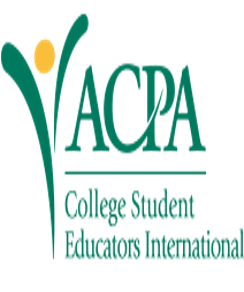On Thursday July 16, 2015 Morgan State University, the American College Personnel Administrators (ACPA) and National Council on Student Development (NCSD) co-sponsored a drive-in conference entitled “Theory to Practice to Outcomes: Connecting Student Development Theory to Community College Practice.” The day started with Dr. Lee Knefelkamp, Professor Emerita of Psychology and Education at Columbia University’s Teachers College. Professor Knefelkamp is the co-creator of the Practice-to-Theory-to-Practice Model used widely in psychology and higher education and Senior Fellow at AAC&U. She was followed by Dr. Deborah Garrett, President, Council for the Advancement of Standards (CAS) and Vice Chancellor for Student Services at Arkansas State University – Beebe. Deb Garrett has worked as an executive-level community college administrator for over 25 years and is a strong advocate for community colleges.
The purpose of the conference was to highlight the utility and benefits of student development theory when developing programs, services, policies, and engaging with individual students in the two-year context. Breakout sessions offered pragmatic connections between theory and practice within various functional areas in community colleges. There was a strong emphasis on connecting the Council for the Advancement of Standards (CAS) in higher education to practice and their effective use in assessment and accreditation for community colleges.
We were exposed to the power of student development in changing individual student experience and student learning and a closing panel of SSAOs helped us make a direct connection between the use of student development and the outcomes-based completion agenda that is at the forefront of current community college reform. Other featured speakers included Dr. Mei-Yen Ireland, Dr. Ashley Babcock, Christopher Conzen, Dr. Case Willoughby, David Green, Marcus Peanort, Jennifer Blackwell, Ever Grier, as well as our panelists, Dr. Ron Smith, Denise McCory, Dr. Yancey Gulley, and Dr. Tyjuan Lee.
Here are a few of my favorite quotes from the day’s dialogue:
“Higher Education is in a revolution, a complete paradigm shift.”
“What is an adequate undergraduate education? Can we refute the false dichotomy of a college education vs. competencies? Employers want people who demonstrate the capacity for team work, people who can work with diversity, demonstrate leadership and decision making skills. They want innovators.”
“We are losing our institutional memory on student development. No one reads the original theory any more. We need to return to that discipline and ensure that the translation we are making is accurate.”
It was a great day with colleagues, where I learned a lot and felt particularly challenged to sort out student learning outcomes from program outcomes. I think we sometimes confuse these in our haste to demonstrate success and our own “value” to the systems where we work. ACPA has a legacy of commitment to the holistic development of diverse learners that have been and continue to be underrepresented in higher education. Community colleges have been the tier of postsecondary education that enrolls vast numbers of underserved and marginalized populations. Until recent years, community colleges have been overlooked however ACPA has long recognized the importance of this tier of higher education. For over five decades, ACPA’s Commission for Two-Year Colleges is has promoted the improvement of student development programs; enhanced the professional development of student development personnel; and served as an advocate for student development programs at two-year institutions. As a former community college administrator, I understand how critical two-year institutions are the postsecondary landscape. I look forward to additional collaborations with community colleges, community college research centers and graduate preparation programs that advance student development and learning outcomes in community colleges as well as areas of practice that can be strengthened by the use of student development theory.
Cynthia Love is the Executive Director, Ex-Officio for ACPA – College Student Educators International




